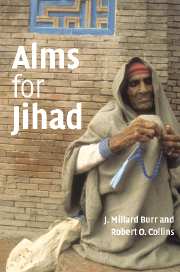|
Alms for Jihad
Alms for Jihad: Charity and Terrorism in the Islamic World is a 2006 book co-written by American authors J. Millard Burr, a former USAID relief coordinator in Sudan, and historian Robert O. Collins which discusses the role of Islamic charities in financing terrorism. ControversyIn August 2007, the UK publisher Cambridge University Press ("CUP"), attempted to have the work removed from circulation due to libel action against them under the English legal system by Saudi businessman Khalid Salim A. Bin Mahfouz because the book accused him of funding al-Qaeda. Kevin Taylor, intellectual property director at Cambridge University Press, stated that the book cited sources "whose falsity had been established to the satisfaction of the English courts" and "the evidence produced by the authors of Alms for Jihad, repeated from earlier sources, has not stood up to the requisite tests."[1] However, the authors of the book opposed CUP's action; instead, they urged Cambridge to contest the lawsuit. CUP was criticized by some[who?] who claimed that its action was incompatible with US freedom of speech laws and with freedom of the press, and also claimed English libel laws were excessively strict.[2][3] In The New York Times Book Review (7 October 2007), United States Congressman Frank R. Wolf described CUP's settlement as "basically a book burning".[4] Effect on salesWithin hours, Alms for Jihad became one of the hundred most popular titles on Amazon.com and eBay in the United States. CUP wrote to libraries asking them to remove copies from circulation. CUP subsequently sent out copies of an errata sheet. The American Library Association issued a recommendation to libraries still holding Alms for Jihad: "Given the intense interest in the book, and the desire of readers to learn about the controversy first hand, we recommend that U.S. libraries keep the book available for their users."[5] Media reportsNathan Vardi published an article in Forbes magazine titled "Sins of the Father?" on March 18, 2002, with the heading: "Khalid bin Mahfouz, a Saudi billionaire, spent the 1990s engaged in financial folly and funding what the U.S. government calls a front for Al-Qaeda. Now a new generation tries to escape the shadow."[6] SubsequentlyThe case led to the passing of the Libel Terrorism Protection Act (also known as "Rachel's Law") by the state of New York on April 29, 2008.[citation needed] Previous casesMahfouz had previously also sued over claims in four other books:
See alsoReferences and sourcesReferences
Sources
External links |
||||||||||||||||||||||||
